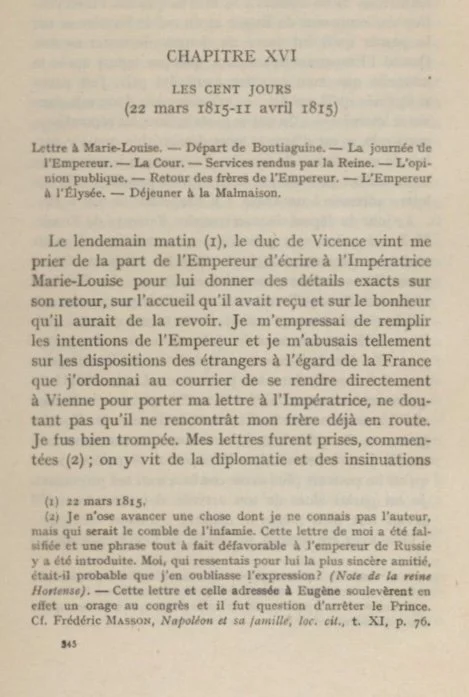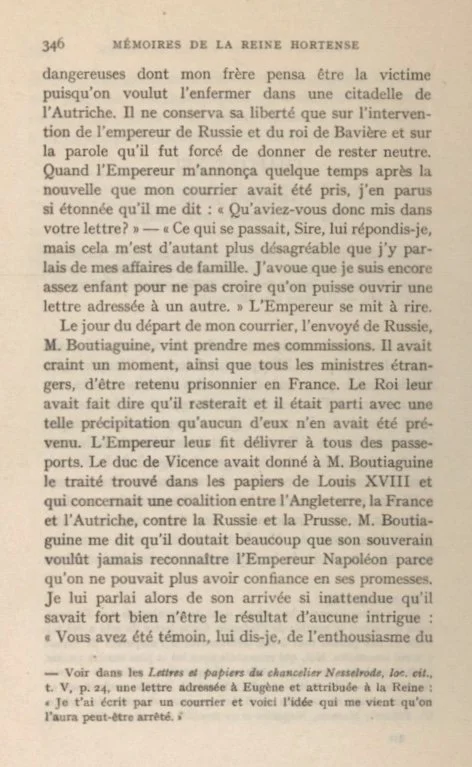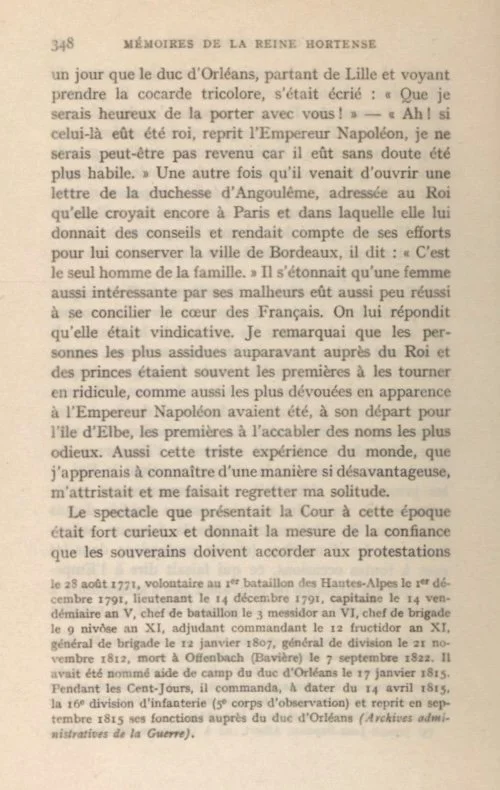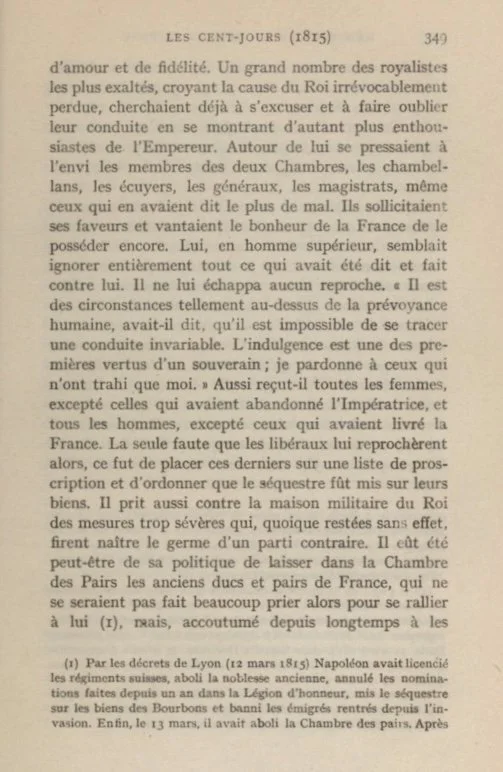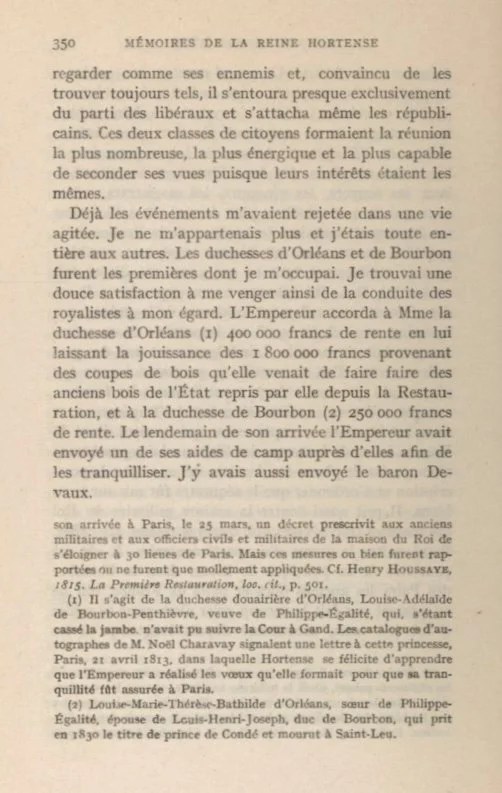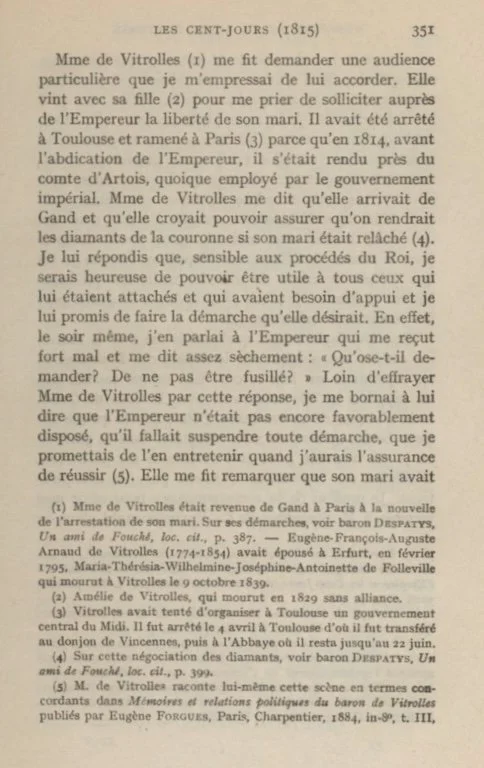Let’s have another look at Hortense’s Memoirs. If you want to read the book it is available for free at the side bar in English and French. Use the widget on the sidebar to translate the text below into pretty much any language.
Hortense describes her efforts to assure peace and to do the right thing.
Hortense’s memoirs continues:
CHAPTER XV
THE HUNDRED DAYS (MARCH 22-JUNE 10, 1815)
Letter from Marie Louise—At Court—How Hortense Helped Napoleon—Public Opinion—Luncheon at Malmaison—Madame Bertrand—Anecdotes About Elba—Napoleon's Mother—Rumors of a Divorce Between Louis Bonaparte and Hortense—Preparing for War—The Champ-de-Mars.
THE following morning [March 22, 1815] the Duc de Vicence called. He asked me to write Empress Marie Louise on behalf of the Emperor who wished me to describe in detail his return and the welcome he had received, and to say how glad he would be to see her again.
I hastened to do as the Emperor requested. I so wrongly judged what the attitude of the Foreign Powers would be toward the Emperor that I told the messenger to proceed directly to Vienna and deliver my letter to the Empress.
I felt sure that on the way he would meet my brother returning to Paris. How grievously I was mistaken! My letters were seized, opened and criticized.
People reading between the lines discovered traces of diplomatic maneuvers and dangerous insinuations.
This interpretation nearly did my brother serious injury as there was talk of imprisoning him in the Austrian citadel. He retained his liberty thanks only to the intervention of the Emperor of Russia and the King of Bavaria and after he had given his word to remain neutral.
When sometime afterwards the Emperor informed me that my messenger had been captured, I seemed so surprised that he said to me, "What in the world did you put in your letter?"
“Only what was taking place, Sire,"
I replied, "but I am the more annoyed because I spoke of family matters.
I admit I am still childish enough not to be willing to believe people can take a letter and open it when it is addressed to someone else."
The Emperor laughed. The same day I sent off my messenger, the Russian envoy Monsieur Boutiaguine sent to ask if I had any messages to deliver abroad. He like the other foreign envoys had been for a moment afraid they would be held as prisoners.
The King had informed them that he was going to remain and then left so hurriedly that none of them had received word of his departure. The Emperor provided passports for all of them.
The Duc de Vicence made a present to Monsieur Boutiaguine of the treaty found in the papers of Louis XVIII, according to which England, France and Austria were to form a coalition against Russia and Prussia.
Monsieur Boutiaguine told me that he doubted if his master would even consent to recognize Emperor Napoleon, because one could not have confidence in his promises. I spoke to him about the Emperor's unexpected return, which, as he was well aware, was not the result of any carefully laid plan, and said to him
“You have seen for yourself the popular enthusiasm. The wishes of the country are clearly evident. If Emperor Napoleon wishes to make war, he will speedily lose the support of the French nation because everyone wants peace. He is too wise and far-seeing not to accept the verdict of an entire nation.
Thus, if war does break out it will be because of the Emperor of Russia's attitude, and I dislike the thought that he could ever be responsible for such a misfortune."
Monsieur Boutiaguine was leaving for Vienna, and I gave him a letter for the Emperor of Russia expressing my hopes for peace. The Emperor worked constantly. He spent part of the mornings reviewing the troops that kept arriving from all over France. He generally dined alone at nine o'clock, but after his return he formed the habit of inviting a few guests. All the generals and their wives dined with him in succession. I would come in about half past nine and go into the dining-room, although they were still at table.
The Emperor was told certain curious particulars about the way in which the King and the princes lived. They were very anxious to revive old customs which had fallen into disuse, among others that of having religious processions go through the streets on Sundays and other feast days.
The Emperor's comment was that the French would never become accustomed to such old-fashioned traditions. General Albert described one day how the Duc d'Orleans on leaving for Lille saw people putting on the tricolor cockade and exclaimed, "How happy I should be if I too could wear that emblem."
“Ah, if he had been king," replied Emperor Napoleon, "I might never have come back, for he would not have made so many mistakes."
Another time, when he had opened a letter from the Duchesse d'Angoulême to the King, who she believed was still in Paris, in which she made certain suggestions and described what she was doing to keep Bordeaux loyal to the royal cause, the Emperor said, "She is the only man in the family."
He expressed his surprise that a woman who deserved so much sympathy on account of her misfortunes had not more thoroughly won the hearts of the French.
He was told that she was vindictive. I noticed that the persons who formerly had been most assiduous in their attention to the King and the princes were the first afterwards to make fun of them, just as those who apparently had been the most devoted to Emperor Napoleon had, when he left for Elba, been those who applied the most insulting epithets to him.
This sad insight into human nature taught me to judge it severely, but it also saddened me and made me regret my solitude. Life at court during this period was a curious one.
Watching it one was able to surmise how much confidence rulers should place in the affection and loyalty of their subjects. A large number of the most devout royalists, believing the cause of the King to be irretrievably lost, already sought to be forgiven and to explain their previous attitude by expressing their violent admiration for the Emperor.
Around him hovered constantly members of both legislative bodies, the chamberlains, the equerries, generals and judges, including those who had most severely condemned him in the past.
They eagerly sought his favors and proclaimed how fortunate France was still to possess him to guide her destinies. He, in his wisdom, seemed entirely ignorant of everything that had been said and done against him. He never uttered a reproach.
“There are circumstances so far above human forsight," he declared, "that it is impossible to lay down any hard and fast line of conduct. One of the most important qualities in a monarch should be his ability to be indulgent. I am prepared to forgive all those who only betrayed me."
Consequently, he received all the women except those who had deserted the Empress and all the men except those who had been false to France. The only fault the liberals could find with him was that he banished the traitors and sequestered all their property.
He also took too harsh steps against members of the King's household, which, although they were not carried out, nevertheless sowed the seed for future hostility.
It might have been more advisable for him to allow the former dukes and peers to remain members of the upper Chamber, for they would not have been unwilling to rally to his support. But he had become accustomed to think of them as his enemies and, convinced they would always remain so, he surrounded himself almost entirely with liberals and even sought to win over the republicans.
These two classes formed the most numerous and the most energetic political group and the one most capable of executing his plans since their interests coincided with his.
Already circumstances made my life again a troubled one. I did not have a moment to myself. Other people claimed every instant of my time.
The Duchesse d'Orleans and the Duchesse de Bourbon were the first to whose interests I had to attend. I also took pleasure in thus revenging myself by kindness for the way in which the royalists had behaved toward me.
The Emperor allowed Madame la Duchesse d'Orleans an income of 400,000 francs besides the sum of 1,800,000 francs due her for the timber she had cut in the former state forests, which she had taken over again during the Restoration.
The Duchesse de Bourbon received an income of 250,000 francs. The day after his arrival the Emperor dispatched one of his aides-de-camp to assure them, they would be safe. I also sent Baron Devaux.
Madame de Vitrolles asked me for a private audience, which request I granted. She came with her daughter to implore me to ask the Emperor to release her husband. He had been arrested at Toulouse and brought to Paris.
In 1814, before the Emperor's abdication he had gone over to the cause of the Comte d'Artois although still in the service of the Emperor. Madame de Vitrolles told me that she had just come from Ghent and felt justified in saying that the crown jewels would be sent back if her husband were released.
I replied that out of gratitude to the King I should be pleased to do anything I could for those who had served him and needed assistance, and I promised to act as she wished. I did indeed speak of the matter to the Emperor that same evening. He answered me in an abrupt manner saying, "What does he dare to expect? Not to be taken and shot?"
Instead of alarming Madame de Vitrolles by repeating this remark I merely told her that the Emperor was not yet favorably disposed toward her husband, that she must take no further action and I would let her know as soon as I believed I could be more successful. She pointed out to me that her husband had been in charge of publishing the Moniteur [the official newspaper] and that not a derogatory word about me had ever been printed in it.
I requested the chief of police to show special consideration toward her husband. Madame de Vitrolles came to see me several times. She overwhelmed me with compliments and exaggerated expressions of her gratitude. These later changed considerably.
Two months afterwards in this same Moniteur I was mentioned along with Madame Hamelin, a very clever woman but not a person I received at my house, as having plotted the return of Emperor Napoleon, and when the writer went on to say I was the cause of all the misfortunes that had befallen France I knew exactly who was responsible for this attack.
Madame Du Cayla sometimes came to see me in the morning. She confided to me her regret that the Bourbons had been forced to leave and her hope that they would return. She did not conceal from me the fact that she was in touch with the court at Ghent.
Far from taking advantage of her confidence I was flattered that she had a sufficiently good opinion of my character to believe I would not be indiscreet in spite of my situation at court.
Moreover, her hopes were not plots. I took advantage of the fact that she was writing to Ghent to offer my services to Monsieur Sosthenes de La Rochefoucauld, whose property had just been sequestered, although I was aware how indignant he was with me.
Monsieur de Lascours, to whom I had given my letter for the King, was not able to go as far as Ghent. He wished to entrust it to Monsieur de La Rochefoucauld, but the latter's remarks made him hesitate. Monsieur de La Rochefoucauld was sure, so he said, that my diamonds had been pawned to pay the troops to desert the King.
My mild manner had deceived him, and he had never imagined I could be involved in such intrigues. Doubtless it was what I had said about public enthusiasm which had convinced him I had been partly responsible for the Emperor's return.
When I complained about his willingness to believe reports which were in contradiction with my character as he knew it, he replied to Madame Du Cayla justifying his attitude. The first part of his reply was in accordance with that belief in the royalist cause which he had always held. He dwelt on his joy in sharing the misfortunes of those illustrious victims of a cause to which he was so utterly devoted.
The original French is available below:


